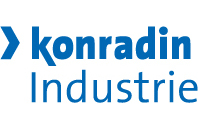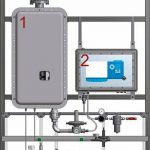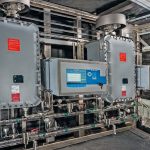Liberalised gas markets and the increased use of process gases as an energy source frequently result in fluctuating gas quality for consumers. If thermally sensitive processes or burners are involved, monitoring and, if necessary, conditioning of the supplied gas is a must. The combustion calorimeters in the CWD2005 series determine the gas parameters required for this purpose directly and continuously. Their suitability is proven on drilling platforms, for example.
Calorimeter with explosion protection checks combustion gas quality
Reliable operation of gas turbines
Liberalised gas markets and the increased use of process gases as an energy source frequently result in fluctuating gas quality for consumers. If thermally sensitive processes or burners are involved, monitoring and, if necessary, conditioning of the supplied gas is a must. The combustion calorimeters in the CWD2005 series determine the gas parameters required for this purpose directly and continuously. Their suitability is proven on drilling platforms, for example.
A reliable energy supply is indispensable on offshore production facilities for production processes, infrastructure and, in particular, safety equipment. If it is not feasible to supply electricity from the shore because of the distance, gas turbines and of late also wind turbines are often used. Gas turbines have the advantage that their “fuel”, in the form of produced natural gas or – in the case of oil platforms – so-called accompanying gas, is available directly on site. At the same time, however, consideration must be given to the fact that safe operation of gas turbines requires a certain combustion gas quality with respect to energy content and that turbines are frequently designed for an explicit gas combustion value. Any deviation from this can affect flame stability and ignition behaviour, reduce efficiency and cause knocking or, in extreme cases, destruction of the turbine. In view of the varying composition of the gas originating directly from the production process, a quality check before feeding it to the turbine is essential.
Continuous calorimetry
Calorimetry is an adopted and proven method for monitoring the combustion gas supplied to gas turbines. Among the equipment-specific solutions in the market today, flow calorimeters that operate directly and continuously are especially well proven. They burn a defined volume of combustion gas continuously, measure the energy released in the process by its transfer to a heat transfer medium and determine the temperature change. This is directly proportional to the required gas pa-rameters (Wobbe index, heating value). The measured value is available with a very short response time for corresponding control or protection measures. Thus, calorimeters of this type contribute decisively to optimum turbine operation and thus to the reliability and availability of the platform’s energy supply.
These combustion calorimeters are easy to use and call for only a moderate investment. In connection with oil and gas production facilities, the devices must obviously meet the relevant requirements for operation in hazardous areas.
CWD2005 series
The combustion calorimeters in the CWD2005 series from Union Instruments determine the heating value, Wobbe index and specific density directly and continuously and calculate the combustion value, combustion air requirement index (CARI) and air requirement. All combustible gases can be measured regardless of their composition. It is also possible to measure unknown gas components, so that this calorimeter can additionally be used in situations where the gas composition changes quickly. Time or event-controlled automatic calibration, high-precision acoustic density measurements and a variety of communication interfaces (e. g. Modbus and Profibus) are among the special features.
The calorimeters are utilised in the iron and steel industry, glass and porcelain manufacturing, chemicals, oil and gas, and energy supply and production. Union Instruments offers a variety of device versions with different measuring ranges to suit each industry sector. Moreover, specific versions are available for custody transfer measurements (CWD2005 CT) and hazardous areas (CWD2005 DPC, CWD2005 SPC (Class I, Division 2, Group B, C, D, T4) and CWD2000 Ex (II 2G Ex d IIA T3 Gb)).
Design with explosion protection
The CWD2000 Ex system consists of a CWD series combustion calorimeter in a flameproof enclosure as well as a control unit and heater, with all units installed in a pressurised en-clo-sure. The EC type examination certificate (BVS 04 Atex E 018 X) proves the suitability of the CWD2000 Ex for use in hazardous areas(II 2G Ex d IIA T3 Gb). This is also confirmed by the Atex approval according to the following standards:
- EN 60079:2009 General requirements
- EN 60079:2007 Flameproof enclosures
The CWD2000 Ex is thus ideal for process control tasks and, in particular, controlling gas turbines on offshore drilling platforms. This generally includes natural gas and liquefied petroleum gas applications. The complete system with pressure controllers, gas and air supplies and filter is installed on a mounting frame. The CWD2000 Ex is optionally also available as a dual instrument to enable redundant measurements.
Industry-specific solutions
Solutions business continues to increase in the measurement automation engineering and process analysis markets. Increasingly, the tendency is for users to order complete solutions from manufacturers and service providers that cover planning, creation and delivery and are exactly customised to an existing, individually specified application. Specialists on the supplier side are then expected to deliver a complete solution, ranging from sampling to data processing and including suitable types of construction, for example for installation in hazardous areas and/or integration in an existing automation system. For this reason, Union Instruments has focused more and more in recent years on developing – and successfully launching – end-to-end measurement solutions for different industry sectors.
The CWD2000 Ex system described above for turbine monitoring on drilling platforms is a good example here. The modular structure of the CWD series is just as beneficial as detailed application know-how in a wide range of industries. Very powerful solutions can be designed by combining calorimetric and spectroscopic measuring technology. The Wobbe index, heating value, etc., as well as methane, CO2, H2S, and higher hydrocarbons such as alkanes, can thus be determined using a single system.
www.prozesstechnik-online.de search: cpp0315unioninstruments
Linda Rudolph
Linda Rudolph
Product Manager CWD,Union Instruments
Share:










